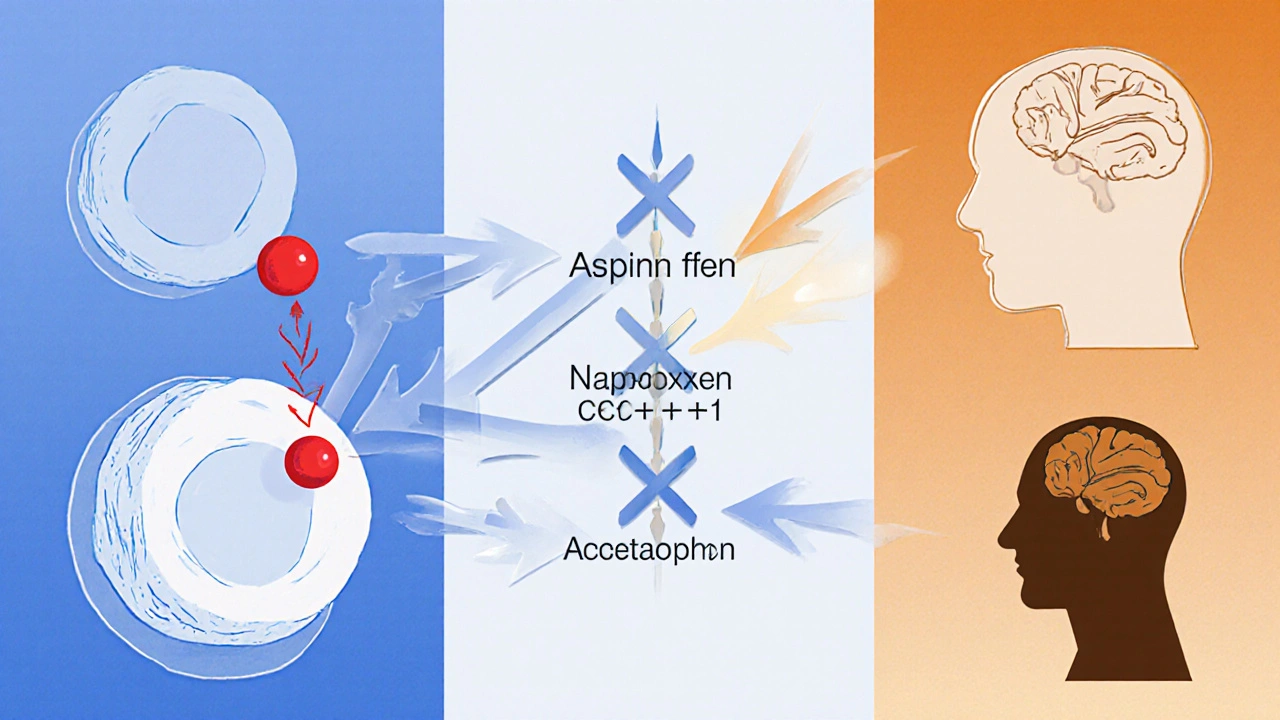Ecosprin vs Alternatives: Drug Selector
Select your needs and click "Find Best Option" to get personalized recommendations.
Ecosprin
Aspirin for pain and heart protection
- • Antiplatelet effect
- • Cardiovascular protection
- • Moderate GI irritation
Ibuprofen
Fast pain relief, moderate GI risk
- • Inflammation reduction
- • May raise blood pressure
- • Short duration
Acetaminophen
Safe for liver, no platelet effect
- • Fever reducer
- • Liver toxicity risk
- • Minimal GI issues
Key Takeaways
- Ecosprin is a standard aspirin formulation with strong blood‑clot prevention benefits.
- Ibuprofen and naproxen offer similar pain relief but differ in cardiovascular risk.
- Acetaminophen eases fever and mild pain without affecting platelets.
- Low‑dose, enteric‑coated aspirin is the preferred choice for heart‑health users.
- Switching drugs should consider dosage, GI tolerance, and existing medical conditions.
What Is Ecosprin?
Ecosprin is a brand‑name tablet of acetylsalicylic acid (aspirin) commonly used for pain relief and cardiovascular protection. It comes in 75mg, 150mg, and 300mg strengths and is marketed in many Asian markets as an affordable aspirin option.
How Aspirin Works
Aspirin belongs to the non‑steroidal anti‑inflammatory drug (NSAID) family. It irreversibly inhibits the enzyme cyclo‑oxygenase‑1 (COX‑1), which reduces the production of thromboxane A2-a molecule that makes platelets clump together. The result is both pain relief and a lowered risk of blood clots.

Common Alternatives to Ecosprin
When people look for “aspirin alternatives,” they usually have three goals in mind: better pain control, fewer stomach side‑effects, or a different cardiovascular profile. Below are the most frequently considered options.
Ibuprofen
Ibuprofen is a widely available NSAID that blocks both COX‑1 and COX‑2, offering faster pain relief than low‑dose aspirin. Typical over‑the‑counter doses range from 200mg to 400mg every 4‑6hours. While it’s gentler on the stomach at lower doses, higher or chronic use can raise blood pressure and increase cardiovascular risk.
Naproxen
Naproxen provides longer‑lasting pain control (up to 12hours) and is often chosen for arthritis. Doses of 250mg to 500mg are common. Like ibuprofen, it inhibits COX‑1 and COX‑2, but its half‑life means fewer pills per day, which some users find convenient.
Acetaminophen (Paracetamol)
Acetaminophen, known outside the U.S. as paracetamol, works primarily in the brain to lower pain signals and fever. It does not affect platelet function, making it a safe option for people on blood‑thinners. Standard dosing is 500mg to 1g every 4‑6hours, but liver toxicity becomes a concern above 4g per day.
Clopidogrel
Clopidogrel is a prescription antiplatelet agent that blocks a different pathway (the ADP receptor). It’s used after stents or in high‑risk heart patients. Typical dose: 75mg once daily. It does not provide analgesic effects, so it’s only an alternative when the goal is platelet inhibition.
Low‑Dose, Enteric‑Coated Aspirin
Enteric‑coated aspirin (usually 81mg) is designed to pass through the stomach before dissolving, reducing gastrointestinal irritation. It maintains the same antiplatelet benefits as regular aspirin but is gentler on the gut.
Side‑Effect Profile at a Glance
All NSAIDs share a risk of stomach irritation, but the degree varies. Below is a quick reference:
| Attribute | Ecosprin (Aspirin) | Ibuprofen | Naproxen | Acetaminophen | Enteric‑Coated 81mg Aspirin |
|---|---|---|---|---|---|
| Typical OTC Dose | 75‑300mg | 200‑400mg | 250‑500mg | 500mg‑1g | 81mg |
| Primary Use | Pain, fever, antiplatelet | Pain, inflammation | Arthritis, pain | Fever, mild pain | Cardiovascular protection |
| Onset of Relief | 30‑60min | 15‑30min | 30‑60min | 30‑60min | 30‑60min |
| Duration of Action | 4‑6hrs (pain) / 24hrs (platelet) | 4‑6hrs | 8‑12hrs | 4‑6hrs | 24hrs (platelet) |
| GI Irritation Risk | Moderate‑High | Low‑Moderate | Low‑Moderate | Very Low | Low (enteric coating) |
| Cardiovascular Impact | Protective (antiplatelet) | May increase risk at high doses | Neutral to slight increase | Neutral | Protective (antiplatelet) |
When to Stick With Ecosprin
If you need a single pill that both eases pain and thins your blood, Ecosprin remains a solid choice. It’s especially useful for:
- People with a history of heart attack or stroke who need daily antiplatelet therapy.
- Those who prefer a low‑cost, widely available medication.
- Individuals who can tolerate mild stomach discomfort or who take it with food.
When an Alternative Might Serve You Better
Consider swapping if you experience any of these situations:
- Stomach pain or ulcers: Enteric‑coated aspirin or acetaminophen reduces irritation.
- Need longer‑lasting pain control: Naproxen’s 12‑hour effect means fewer doses.
- High blood pressure or heart‑failure concerns: Ibuprofen and naproxen can raise BP, so a cardio‑focused aspirin or clopidogrel may be safer.
- Only fever relief is required: Acetaminophen gets the job done without affecting clotting.
Practical Tips for Switching Safely
- Check with a healthcare professional. They’ll review your medical history, especially if you’re on blood thinners or have kidney disease.
- Match the therapeutic purpose. If you’re using Ecosprin for heart protection, replace it with another antiplatelet (enteric‑coated aspirin or clopidogrel), not a pure painkiller.
- Watch dosage. For example, 300mg of regular aspirin ≈ 81mg of low‑dose cardio aspirin for antiplatelet effect-do not assume they’re interchangeable.
- Observe timing with meals. Taking NSAIDs with food or a glass of milk can blunt GI upset.
- Monitor side effects for two weeks after the change. Report any new stomach pain, bleeding, or unusual bruising.
Frequently Asked Questions
Can I take Ecosprin with ibuprofen?
Mixing two NSAIDs can increase stomach bleeding risk and may blunt the antiplatelet benefit of aspirin. If you need extra pain relief, talk to a doctor about using acetaminophen instead.
Is enteric‑coated aspirin as effective for heart protection?
Yes. The coating only changes where the tablet dissolves, not how it affects platelets. It delivers the same 81mg dose that doctors recommend for cardiovascular health.
Why would someone choose clopidogrel over aspirin?
Clopidogrel works on a different platelet pathway and is often prescribed for patients who can’t tolerate aspirin or who have had a recent stent placement. It’s a prescription‑only option.
Is naproxen safe for long‑term use?
Naproxen is less likely to raise blood pressure compared with ibuprofen, but prolonged use still carries GI and kidney risks. Use the lowest effective dose and have regular check‑ups.
What’s the biggest difference between aspirin and acetaminophen?
Aspirin blocks platelet function and can prevent heart attacks, while acetaminophen only reduces pain and fever without affecting clotting. Their safety profiles also differ: aspirin can irritate the stomach, whereas acetaminophen can harm the liver at high doses.






18 Comments
ayan majumdar
October 6, 2025 AT 17:20 PMEcosprin works but watch stomach.
Johnpaul Chukwuebuka
October 6, 2025 AT 18:26 PMGreat guide! It helps me pick the right pill for my knee pain without hurting my tummy.
Xavier Hernandez
October 6, 2025 AT 19:33 PMReading this guide reminded me why we should be responsible with over‑the‑counter meds.
Aspirin may be cheap, but it’s not a toy you toss around like candy.
If you ignore the GI warnings, you’re flirting with bleeding that could ruin your life.
Ibuprofen is a quick fix, yet many treat it like a miracle without thinking about blood pressure.
Naproxen lasts longer, but the trade‑off is a higher chance of kidney strain.
Acetaminophen claims to be gentle, but massive doses turn a harmless fever reducer into a liver assassin.
Enteric‑coated aspirin tries to be polite to your stomach, yet it still carries the antiplatelet punch.
Clopidogrel is for the high‑risk crowd; you don’t self‑prescribe that without a doctor’s nod.
The key is matching the pill to the purpose-pain, fever, or heart protection-not just grabbing what's on the shelf.
Never combine two NSAIDs; the bleeding risk skyrockets and you lose the protective effect of aspirin.
If you need extra pain relief, reach for acetaminophen, not a second ibuprofen.
Always check your current meds; many blood thinners already tilt your clotting balance.
Aspirin’s antiplatelet action is priceless after a heart attack, but for simple aches, there are safer options.
Remember to take NSAIDs with food; an empty stomach is a recipe for ulcer disaster.
Bottom line: read labels, respect dosages, and consult a professional before swapping drugs.
Zach Yeager
October 6, 2025 AT 20:40 PMHonestly this stuff is basic but if you’re American you should stick to the tried‑and‑true stuff.
Angel Gallegos
October 6, 2025 AT 21:46 PMThe comparison feels rudimentary, lacking nuanced pharmacokinetic analysis that a serious scholar would demand.
ANTHONY COOK
October 6, 2025 AT 22:53 PMNice table 👍 but don’t forget that chronic NSAID use can secretly damage kidneys 😐 keep an eye on labs.
Sarah Aderholdt
October 7, 2025 AT 00:00 AMMatch your choice to your main goal-pain, fever, or heart health.
Phoebe Chico
October 7, 2025 AT 01:06 AMLife’s a balance, just like choosing meds-some protect the heart while others soothe the soul.
Larry Douglas
October 7, 2025 AT 02:13 AMThe pharmacodynamics of aspirin involve irreversible COX‑1 inhibition, which distinguishes it from reversible NSAIDs like ibuprofen. This irreversible action underlies its antiplatelet effect, making low‑dose aspirin a cornerstone in secondary prevention of myocardial infarction. However, the same mechanism also predisposes patients to gastrointestinal mucosal injury, especially at higher doses. Comparatively, ibuprofen’s reversible inhibition provides quicker pain relief but lacks sustained platelet inhibition. Naproxen offers a longer half‑life, reducing dosing frequency, yet shares similar GI risks. Acetaminophen, lacking COX inhibition peripherally, avoids platelet effects entirely, positioning it as a safer option for patients on anticoagulants, provided hepatic function is monitored.
Michael Stevens
October 7, 2025 AT 03:20 AMGreat summary! I’d add that people with ulcers should definitely consider the enteric‑coated version.
Ann Campanella
October 7, 2025 AT 04:26 AMIf you’re okay with a few stomach aches, just grab the cheap aspirin.
Desiree Tan
October 7, 2025 AT 05:33 AMDon’t ignore the side‑effects-talk to your pharmacist before switching, it could save you from a nasty bleed.
Andrea Dunn
October 7, 2025 AT 06:40 AMThey don’t tell you that big pharma pushes ibuprofen to keep you buying forever 😒.
Erin Johnson
October 7, 2025 AT 07:46 AMOh sure, because everyone loves a good liver failure story-take 5g of acetaminophen and you’ll see why the warnings exist. 🎭
Rica J
October 7, 2025 AT 08:53 AMi think the table is v helpful lol
Linda Stephenson
October 7, 2025 AT 10:00 AMAnyone know if the enteric coating affects how quickly the antiplatelet effect kicks in?
Sarah Aderholdt
October 7, 2025 AT 11:06 AMYou nailed the responsibility bit-people need that reminder.
Sunthar Sinnathamby
October 7, 2025 AT 12:13 PMLove the detail, Larry! Adding a note about renal monitoring would make it perfect.